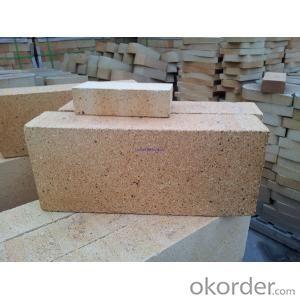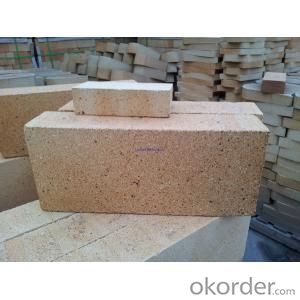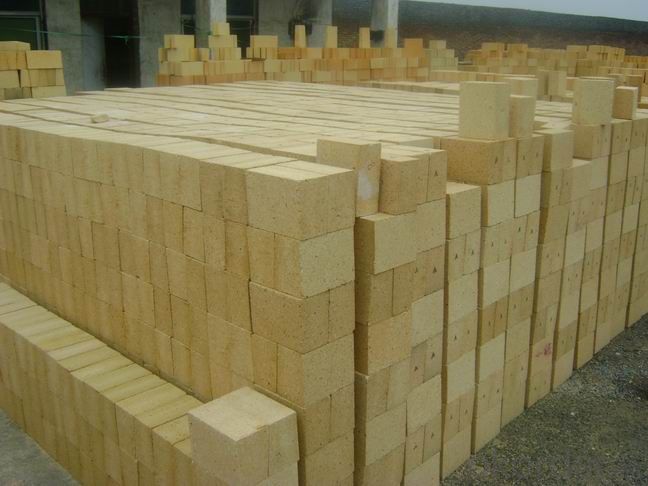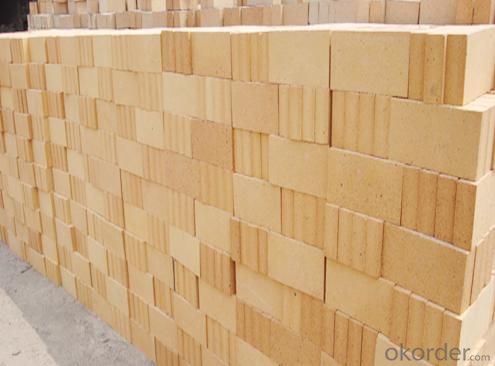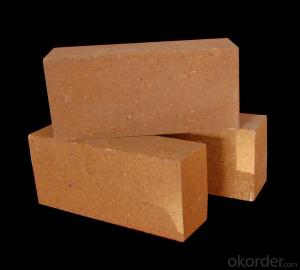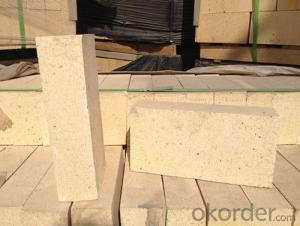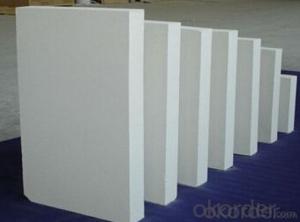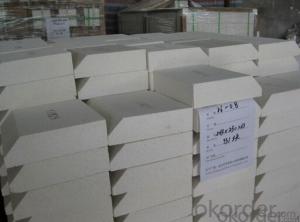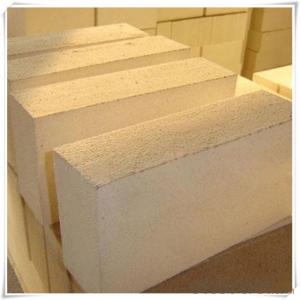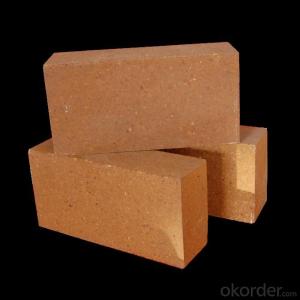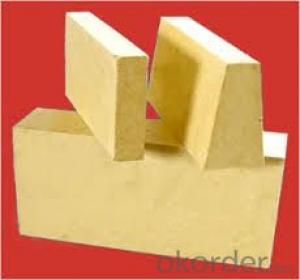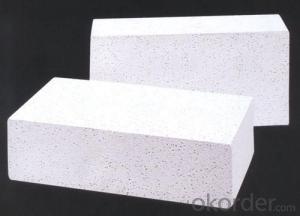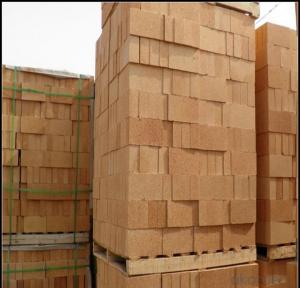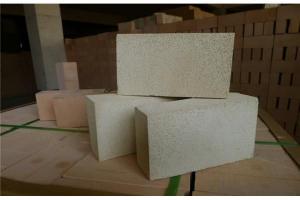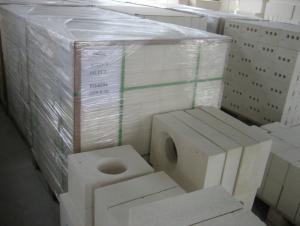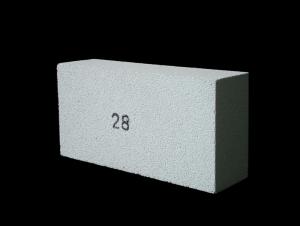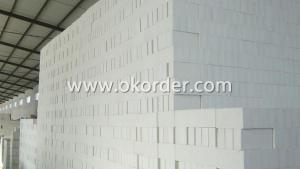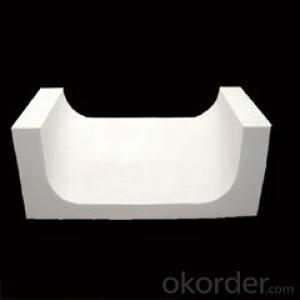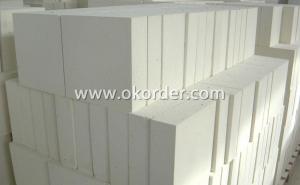Insulating Fire Brick for Thermal Insulation in Steel Industry
- Loading Port:
- Tianjin
- Payment Terms:
- TT OR LC
- Min Order Qty:
- 20 m.t.
- Supply Capability:
- 10000 m.t./month
OKorder Service Pledge
OKorder Financial Service
You Might Also Like
CNBM conforms strictly to the requirements of ISO 9000 quality control system during the production. MSDS is also available if you want. The thermal insulation fire clay brick meet with the requirements of ASTM & JIS standards. So pls stay cool with our quality.
Insulating Fire Brick Technical index
Product No. | IFB70 | IFB60 | IFB50 | IFB40 |
Al2O3 | 68%-72% | 58%-62% | 48%-52% | 38%-40% |
Refractoriness (°C ) | ≥1790 | ≥1790 | ≥1790 | ≥1790 |
Bulk density (g/cm3) | 2.50-2.60 | 2.35-2.45 | 2.20-2.30 | 2.10-2.20 |
Apparent porosity (%) | 22 | 19-22 | 17-20 | 17-20 |
Cold Crushing strength (kg) | 480-510 | 450-480 | 430-450 | 390-430 |
Application
Insulating Fire Brick are used for the lining of converter, alternating current arc furnace, direct Current arc furnace and the ladle slag line, etc.
Equipment
1 unit of Ceramic Abrasive (SG Abrasive) pilot production line
2 units of Compact grain Abrasive pilot production lines
1 unit of high-end coated abrasives (abrasive cloth) production line
2 units of Boron Carbide production lines
3 large flexible crushing and sieving lines for grit production lines
2 units of 2000KVA furnaces for Boron Carbide fusion
6 units of 5000KVA-10000KVA dumping type electric arc furnaces for Brown Fused Alumina fusion
Company Advantage
(1)Long Insulating Fire Brick manufacture history: 25 years manufacturer
(2)Advanced equipment
(3)Diversification of production standards: ISO ANSI FEPA JIS ASTM
(4)Flexible payment: T/T L/C D/P D/A
(5)Professional marketing team and after-sale service
(6)Free sample
FAQs
Q1 |
What’s the transport method? |
A1 | FCL delivery goods with wooden pallet or wooden case by sea; If LCL delivery, must with wooden case; Sometimes need open top, flat rack or bulk cargo. |
Q2 |
What’s the required payment term? |
A2 | Generally 30% TT as the prepayment, 70% TT before delivery. If need, 100% Irrevocable Letter of Credit or negotiation. |
Q3 |
Which country are our products exported to? |
A3 | Apart from entire Chinese market, the US, Russia, Japan, Korea, Australia and some Southeast Asian Nations. |
- Q: Can insulating fire bricks be used in boilers for steam generation?
- Yes, insulating fire bricks can be used in boilers for steam generation. Insulating fire bricks have excellent thermal insulation properties, which help to minimize heat loss and increase the overall energy efficiency of the boiler. Additionally, their high temperature resistance makes them suitable for the high heat and pressure conditions present in steam generation applications.
- Q: Are insulating fire bricks resistant to carbon dioxide?
- Yes, insulating fire bricks are resistant to carbon dioxide.
- Q: Can insulating fire bricks be used as a structural material?
- Insulating fire bricks serve primarily to provide thermal insulation in high-temperature environments like furnaces, kilns, and fireplaces. Despite their excellent insulation properties, they are typically not advised for use as a structural material in load-bearing applications. Constructed from lightweight refractory materials, insulating fire bricks aim to minimize heat transfer. They possess low density and are generally less sturdy or long-lasting than standard bricks or other structural materials. They are more prone to cracking, particularly when subjected to heavy loads or mechanical stress. Should they be employed as a structural material, insulating fire bricks may lack the capacity to bear weight or endure the forces that conventional structural materials are designed to withstand. Such a scenario could result in structural failure, placing the safety and integrity of the building or structure at risk. It is crucial to seek guidance from a structural engineer or building professional to determine the appropriate materials for your specific project. They will consider factors like load requirements, safety regulations, and durability to ensure that the chosen structural materials are suitable and meet the necessary standards. In conclusion, while insulating fire bricks are effective for thermal insulation purposes, they are generally not suitable for use as a structural material due to their inferior strength and durability when compared to traditional structural materials.
- Q: Can insulating fire bricks be used in solar power plants?
- Yes, insulating fire bricks can be used in solar power plants. Insulating fire bricks are designed to have excellent thermal insulation properties, making them suitable for applications that require heat resistance and energy efficiency. Solar power plants often involve high temperatures and the need to retain heat, such as in concentrated solar power (CSP) systems. Insulating fire bricks can be used to line the walls and floors of CSP receivers and thermal storage systems, helping to minimize heat loss and maximize the conversion of solar energy into electricity. Additionally, insulating fire bricks can also be used in other components of solar power plants, such as in the insulation of solar panels or in the construction of solar tower structures.
- Q: Are insulating fire bricks suitable for insulation in power boilers?
- Insulating fire bricks can be suitable for insulation in power boilers depending on the specific requirements and conditions of the boiler. Insulating fire bricks are known for their high temperature resistance and low thermal conductivity, which makes them effective in reducing heat loss and improving energy efficiency in various applications. However, when considering their use in power boilers, several factors need to be taken into account. Firstly, the operating temperature and pressure of the boiler should be considered to ensure that the insulating fire bricks can withstand these conditions without any degradation or failure. Power boilers typically operate at high temperatures and pressures, so it is important to choose insulating fire bricks that have a high temperature rating and can withstand the required pressure. Additionally, the composition and structure of the insulating fire bricks should be considered. Some power boilers may contain corrosive or abrasive substances, which can potentially damage the insulating fire bricks over time. Therefore, it is important to select insulating fire bricks that are resistant to corrosion and abrasion, or to consider additional protective measures such as coatings or linings. Furthermore, the thermal conductivity of the insulating fire bricks should be evaluated. While insulating fire bricks have low thermal conductivity compared to other refractory materials, it is important to ensure that they provide sufficient insulation for the specific requirements of the power boiler. This may involve calculating heat transfer rates and determining the appropriate thickness and density of the insulating fire bricks to achieve the desired insulation performance. Ultimately, the suitability of insulating fire bricks for insulation in power boilers depends on careful consideration of factors such as temperature, pressure, composition, structure, and thermal conductivity. Engaging with experts and conducting proper evaluations and calculations will help determine if insulating fire bricks are a suitable choice for insulation in a particular power boiler application.
- Q: Can insulating fire bricks be used in DIY projects?
- Yes, insulating fire bricks can be used in DIY projects. They are commonly used in various DIY applications such as constructing fire pits, ovens, kilns, and for lining chimneys. These bricks have excellent insulation properties, can withstand high temperatures, and are easy to work with, making them ideal for DIY projects requiring heat resistance.
- Q: Do insulating fire bricks emit any harmful substances when heated?
- No, insulating fire bricks do not emit any harmful substances when heated.
- Q: Do insulating fire bricks require any curing or drying time before use?
- No, insulating fire bricks do not require any curing or drying time before use. They are ready to be used immediately after installation.
- Q: If there is a main component of cenosphere light insulating brick.
- Before 2003 because the price is cheaper to do so cenosphere light heat insulation brick is generally used zeeospheres. After 2003 basically replaced by fly ash and other lightweight refractory material, but some high-grade light brick or floating beads.
- Q: Can insulating fire bricks be used in thermal oxidizers?
- Yes, insulating fire bricks can be used in thermal oxidizers. Insulating fire bricks are designed to have low thermal conductivity, meaning they can effectively reduce heat transfer and conserve energy in high-temperature applications. Thermal oxidizers are devices used to treat industrial exhaust gases by oxidizing pollutants at high temperatures. By using insulating fire bricks in the construction of thermal oxidizers, heat can be contained within the system, ensuring efficient combustion and minimizing heat loss to the surroundings. This not only improves the overall thermal efficiency of the thermal oxidizer but also helps to reduce energy consumption and operating costs. Additionally, insulating fire bricks are highly resistant to thermal shock and have excellent insulating properties, making them suitable for the harsh and demanding conditions typically found in thermal oxidizers.
Send your message to us
Insulating Fire Brick for Thermal Insulation in Steel Industry
- Loading Port:
- Tianjin
- Payment Terms:
- TT OR LC
- Min Order Qty:
- 20 m.t.
- Supply Capability:
- 10000 m.t./month
OKorder Service Pledge
OKorder Financial Service
Similar products
Hot products
Hot Searches
Related keywords
